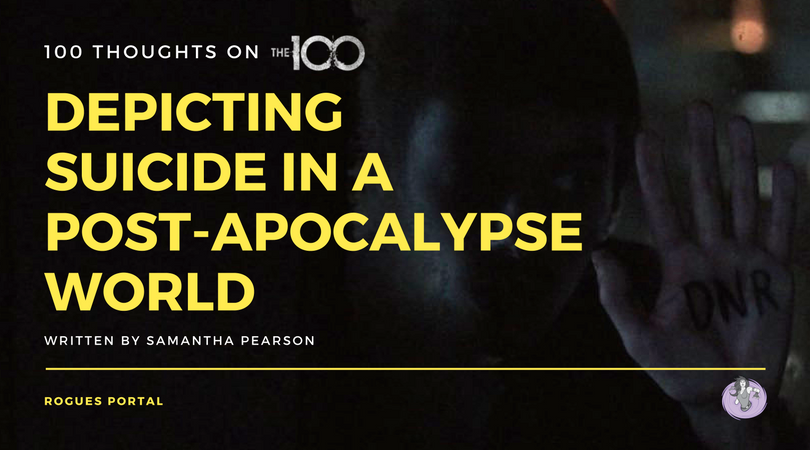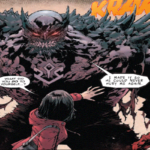
Trigger Warning: The following piece explores suicide and suicide ideation.
Death is like an old friend to the characters on The 100. A punishment on the Ark, a seeming inevitability on the ground, death comes for these characters every week and while many of them escape it, some aren’t so lucky. Some are killed in problematic ways that set off waves of criticism in the media; some are killed as a slap in the face for their actors and for social justice movements that seek to eradicate racist power.
Others want to die, but find that in a post-apocalyptic, pre-nuclear death wave world, suicide is a moot point. And still others are kept from taking their own lives by friends and even acquaintances.
The way The 100 deals with suicide is complicated. Ultimately, death has always been decided for these characters — by other people. Whether they’re floated for committing crimes, sent to the Earth to discover whether it’s habitable for humans (with a high likelihood of dying), killed in a war, or left to die for the safety of others, the characters on The 100 rarely have any say in when or how they die.
In contrast, the ability to decide when and how they die seems like a new kind of freedom.
“You sent them down to die. The difference now is that they have a choice, and so do you.”
— Bellamy, 4×09: “DNR”
Suicide ideation has been a recurring arc for Jasper Jordan since his girlfriend Maya was irradiated in the mountain at the end of season two. He spent the first half of season three drunk out of his mind, snapping at anyone who so much as spoke to him — especially Clarke, Bellamy, and Monty, who made the choice to irradiate Mt. Weather to save their people.
Jasper spent the latter half of season three in a state of chip-induced euphoria, having given into ALIE’s wishes and gone to the City of Light to escape his pain. Most of the characters took the chip in season three after being forced into it by the mob of others who did so willingly. Again, the issues of free will and bodily autonomy come into play here — though these people weren’t condemned to death, they were forced into a state of being that they didn’t want.
In season four, once ALIE has been defeated, suicide crawls to the forefront of everyone’s consciousness. If they cannot figure out a way to survive the incoming nuclear death wave, they will all die. The closer the show gets to that moment, the more characters are choosing to stop fighting, to stop trying for ways to survive.
The major question of this season, more than any other, is “what is the difference between living and surviving?”
Is it better to hole up in a bunker to wait out five more years of radiation poisoning, or let the death wave take them? Is it better to choose when they die, and how, or fight for a spot in said bunker only to potentially be killed later? Does it matter? And most of all, why bother when history just seems to keep repeating itself?
The Ark died. With it, thousands of humans died also. The sacrifices made to sustain the human race seem to have been made in vain, now that the remaining survivors are on Earth and yet another nuclear apocalypse is coming for them.
There are a lot of problematic elements of this ideation of suicide that honestly begin with the plot itself. Rather than forcing the characters into another “the world is ending” situation, it would have been more interesting and more nuanced to actually make them figure out survival on the ground. Given that there are major conflicts between grounder clans and we haven’t seen hardly any animal life or the threats it could post to humanity, there are so many choices of where the writers could have gone other than “second nuclear meltdown.”
Beyond that, arguing that because death is inevitable, suicide is the right choice is never okay. Given that all of the characters who’ve considered suicide — save for one — do so be cause of romantic heartbreak, it’s clear that The 100 gives little care for following media guidelines for talking about suicide.
This recklessness with storytelling about suicide appears to be a growing trend. The issue has recently become an international discussion in the wake of Netflix premiering 13 Reasons Why, a series adapted from a young adult novel about a victim of suicide whose friends receive 13 tapes detailing why she did it after she’s died.
Suicide experts warned 13 Reasons Why producers against much of what was included in the final cut of the series, because this kind of storytelling can inspire more teens to commit suicide. Rather than start often much-needed discussions about depression, reckless depiction of suicide in popular media that’s largely absorbed by teen audiences is dangerous.
Despite its setting, The 100 is not exempt from these criticisms.
The number one cause for suicide is untreated depression. In a post-apocalyptic world, how can people receive treatment for depression? How does depression fit into this narrative? I’ll admit that these questions are hard to answer, but it seems as though focusing on characters who’ve had their hearts broken is especially reckless. It trivializes suicide as a means of getting over heartbreak.
Jasper writes a note and holds a gun to his jaw early in season four while he listens to music on Maya’s old MP3 player. He’s interrupted by the announcement that everyone is going to die, and has spent the rest of the season being completely cavalier about his personal safety. It’s put other characters into danger when they try to save him, which isn’t okay — but it’s clear that no one is equipped to actually help Jasper get over his pain or want to live again. And that’s hard as hell to watch.
When Octavia tries to walk into acid rain to end her life, she’s pulled back by Illian. They then start a sexual relationship, which suggests that the only way to save someone from suicidal thoughts is to seduce them into feeling better.
That’s really not okay.
In episode 4×09, opting to die in the death wave seems to be trendy. Many of the delinquents — headed by Jasper, and later Harper — have decided not to go with the rest of their people to the bunker that will supposedly keep them all safe from the incoming death wave. They’ve chosen to party until the end of the world, because they’re tired of fighting or because they don’t see the point.
Meanwhile, Raven Reyes’ brain is deteriorating at a rapid rate because a piece of ALIE’s code is still embedded in it. She’s suffered from a heart murmur since she was on the Ark, then had her leg shot to pieces by Murphy in season one. In season two, she lost the only person she’d ever loved and in season three, she had to have ALIE forcibly removed from her body after the AI tried to make her commit suicide to keep her friends from stopping the City of Light takeover.
She’s been in pain every day since Murphy shot her and has continued to fight, as hard as she can, regardless of that fact. In spite of it, most days. But in 4×09, as she continues to suffer from hallucinations as a result of her brain damage, she chooses not to go with the others to the bunker so that she doesn’t take up resources and space.
It’s very likely that Raven is going to die, sooner than later, because she can’t use her brain. And her brain is all that she has left.
“Do you have any idea what it feels like to be in pain every day?”
— Raven, 4×09: “DNR”
Actress Lindsey Morgan said she had a hard time wrapping her head around Raven’s suicidal thoughts, but that she eventually understood that it’s Raven accepting death. Morgan said the decision seemed “selfish”, which is out of character for Raven, who sacrifices so much of herself all the time for the betterment of everyone else.
The 100 certainly paints suicide as a selfish act in every instance, but there’s also a counterpoint from characters like Bellamy, who continuously argue that “you can’t save someone who doesn’t want to be saved.”
As many of the characters opt for death in the nuclear wave and those who love them try to convince them to keep living, others seem to believe that you can’t force people to want to live. And when death seems inevitable, anyway, is it worth it to fight about personal choice when instead you could be saying goodbye and expressing your love?
There’s a lot to break down, in this show’s representation of suicide. I think it deals with more sides of the issue than other series, but also does a poor job of depicting the realities.
The rest of season four will likely be jam-packed with more discussion of death and suicide, which makes me nervous not only for my favorite characters but for all of the young people who watch this series.
If you have thoughts of suicide, call 1-800-SUICIDE or 1-800-273-TALK. For suicide hotlines outside of the US, see here.



